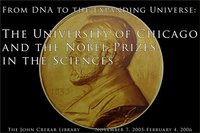The Nobel Prize knows no boundaries of geography or nationality
and individuals from around the World have received this
prestigious award. But a few institutions have produced an
especially large number of Nobel Prize winners. The University of
Chicago is an excellent example. Seventy-eight Nobel laureates have
been faculty members, students or researchers at some time during
their careers. In the sciences, 26 were awarded in Physics, 15 in
Chemistry, and 11 in Physiology or Medicine. The University of
Chicago's legacy of Nobel Prizes began in 1907, when Albert
Michelson received the prize for measuring the speed of
light.
This exhibit, originally developed for the Nobel Prize Centennial
Exhibition of the Nobel Foundation in Sweden, and displayed in the
Museum of Science and Industry in the fall of 2003, has been
adapted for display in the John Crerar Library, with a focus on
Nobel Prize winning scientists such as Enrico Fermi, Subramanyan
Chandrasekhar and James Watson.
